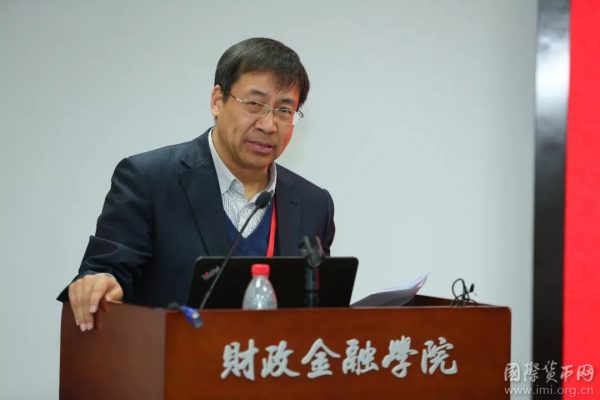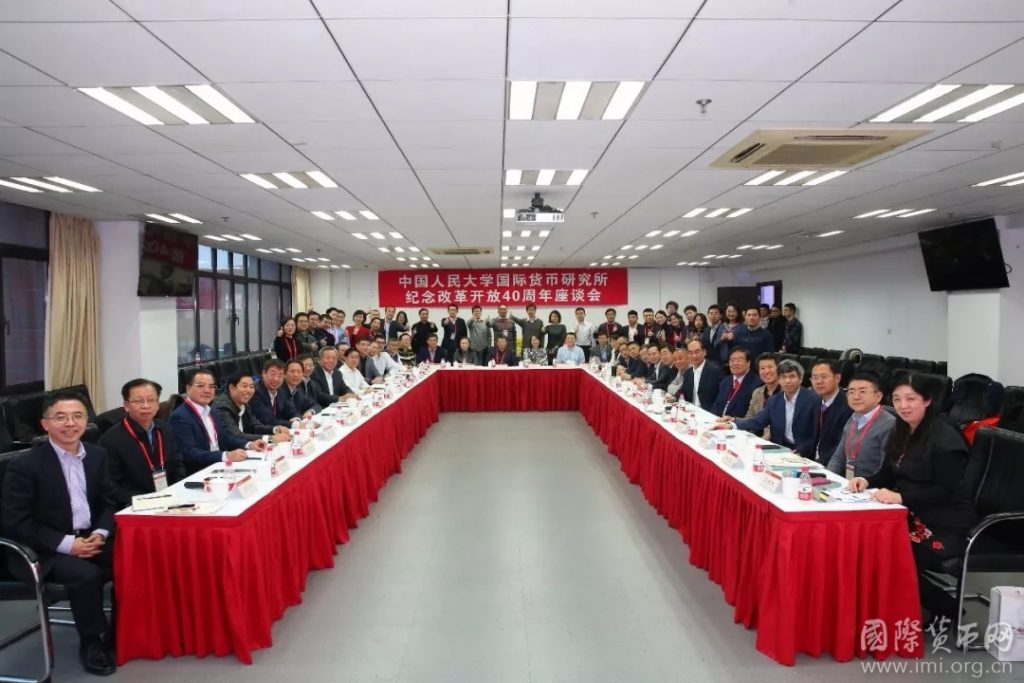The New Year Symposium in Memory of the 40th Anniversary of the Reform and Opening-up
2019-01-05 IMI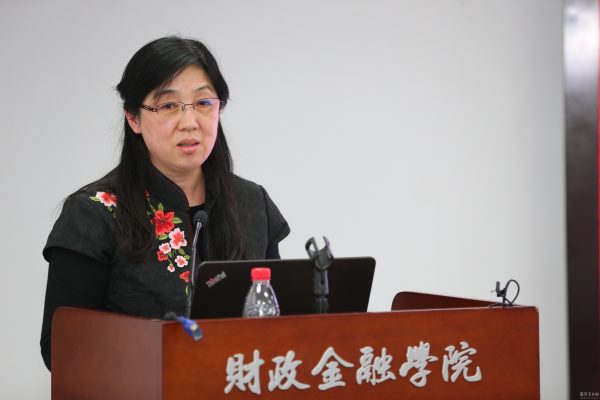 Wu Xiaoqiu, vice president of RUC, delivered a speech first. In reference to General Secretary Xi Jinping’s important speech at the 40th Anniversary of Reform and Opening-up, he pointed out that continuing the reform and opening up, adhering to socialist market economy and adhering to the guidelines of emancipating the mind and seeking truth from facts contributed to outstanding achievements of the reform and opening up. In the past 40 years, China’s financial market has developed by leaps and bounds. It has not only scaled up, but also transformed from financing-led structure to a diversified structure. In the future, China’s finance will be more marketized, internationalized, technology-driven, and diversified. The function of China’s finance will also change dramatically, with risk control and asset management functions playing a more prominent role.
Wu Xiaoqiu, vice president of RUC, delivered a speech first. In reference to General Secretary Xi Jinping’s important speech at the 40th Anniversary of Reform and Opening-up, he pointed out that continuing the reform and opening up, adhering to socialist market economy and adhering to the guidelines of emancipating the mind and seeking truth from facts contributed to outstanding achievements of the reform and opening up. In the past 40 years, China’s financial market has developed by leaps and bounds. It has not only scaled up, but also transformed from financing-led structure to a diversified structure. In the future, China’s finance will be more marketized, internationalized, technology-driven, and diversified. The function of China’s finance will also change dramatically, with risk control and asset management functions playing a more prominent role.
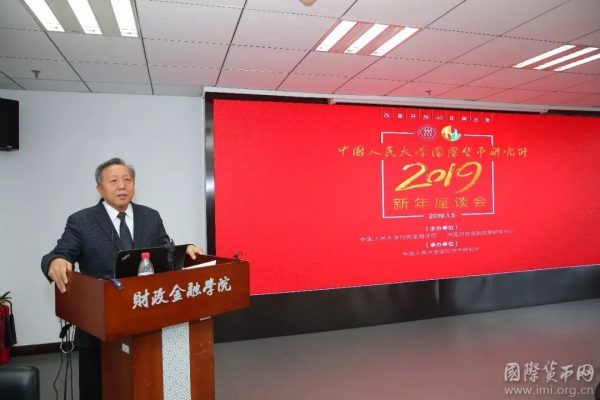 Then, Wei Benhua, IMI Academic Committee member, Former Deputy Administrator-in-Bureau of SAFE and Former Executive Director for China in IMF, Wang Guogang, IMI Academic Committee member, Professor of the School of Finance of RUC and Member of Academic Committee, CASS, and Wang Zhongmin, IMI Advisory Board member and former vice chairman of the National Council for Social Security Fund delivered keynote speeches respectively.
Wei Benhua combined his work experience with the People’s Bank of China, the IMF and other international organizations to tell the stories of himself and the reform and opening up. He summed up the major events thatshows China’s influence in international organizations over the past few decades, and praised IMI’s Jintong talent program as a talent training plan. He noted that this plan mobilized IMF experts and economists to cultivate students into talents with an international perspective. He reviewed the difficulties and experiences he encountered when he was the president of an international organization, and emphasizedChina’s great achievements in diplomacy during the 40 years of reform and opening up.
Then, Wei Benhua, IMI Academic Committee member, Former Deputy Administrator-in-Bureau of SAFE and Former Executive Director for China in IMF, Wang Guogang, IMI Academic Committee member, Professor of the School of Finance of RUC and Member of Academic Committee, CASS, and Wang Zhongmin, IMI Advisory Board member and former vice chairman of the National Council for Social Security Fund delivered keynote speeches respectively.
Wei Benhua combined his work experience with the People’s Bank of China, the IMF and other international organizations to tell the stories of himself and the reform and opening up. He summed up the major events thatshows China’s influence in international organizations over the past few decades, and praised IMI’s Jintong talent program as a talent training plan. He noted that this plan mobilized IMF experts and economists to cultivate students into talents with an international perspective. He reviewed the difficulties and experiences he encountered when he was the president of an international organization, and emphasizedChina’s great achievements in diplomacy during the 40 years of reform and opening up.
 Wang Guogang delivered a keynote speech entitled “China’s Finance in the Past 40 Years: History, Experience and Prospects”, summarizing the main experiences and achievements of financial reform in the past 40 years. He divided the 40 years of financial reform and opening up process into four stages, and raised suggestions on how to construct a modern financial system, including bringing market mechanisms into full play; improving the macro-prudential and monetary policies, ensuring financial supervision cover allfinancial behaviors, reforming and adjusting the financial structure in a timely manner in accordance with scientific and technological progress and the requirements of the real economy, so that the domestic financial system maintains a strong advantage and influence amid the international competition.
Wang Guogang delivered a keynote speech entitled “China’s Finance in the Past 40 Years: History, Experience and Prospects”, summarizing the main experiences and achievements of financial reform in the past 40 years. He divided the 40 years of financial reform and opening up process into four stages, and raised suggestions on how to construct a modern financial system, including bringing market mechanisms into full play; improving the macro-prudential and monetary policies, ensuring financial supervision cover allfinancial behaviors, reforming and adjusting the financial structure in a timely manner in accordance with scientific and technological progress and the requirements of the real economy, so that the domestic financial system maintains a strong advantage and influence amid the international competition.
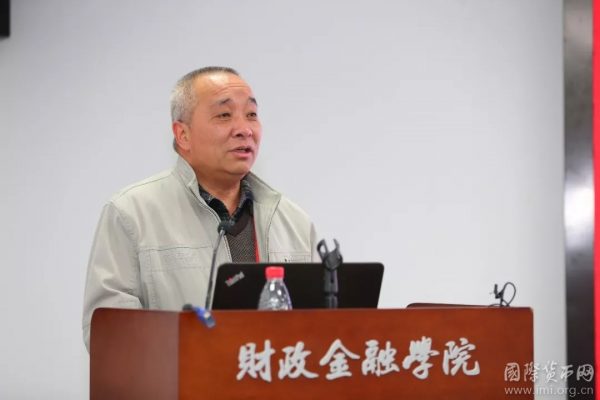 Wang Zhongmin delivered a keynote speech entitled “the distortion of credit scenarios”. He took the central bank’s RRR cut on January 4 as an entry point to talk about the main problem of China’s monetary policy transmission - the distortion of the credit scenarios. After 40 years of reform and opening up, China's credit scenarioshave not yet centered on natural persons and legal persons. This is a problem and also an area for future development.
Wang Zhongmin delivered a keynote speech entitled “the distortion of credit scenarios”. He took the central bank’s RRR cut on January 4 as an entry point to talk about the main problem of China’s monetary policy transmission - the distortion of the credit scenarios. After 40 years of reform and opening up, China's credit scenarioshave not yet centered on natural persons and legal persons. This is a problem and also an area for future development.
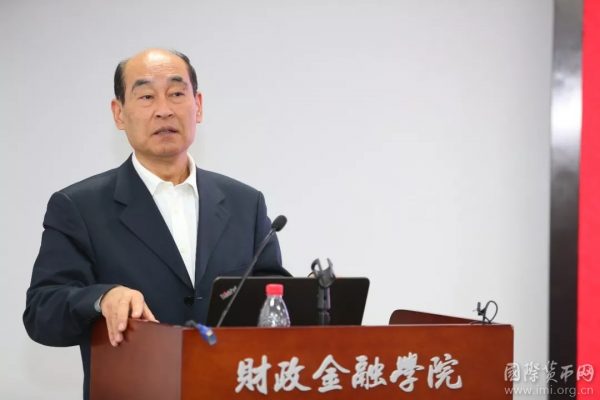 The round-table discussion session was chaired by Prof. Ben Shenglin, IMI Co-Director, Dean of the Academy of Internet Finance of Zhejiang University, and Dean of the International Business School of Zhejiang University. Other guests include Ji Zhihong, director of Finance Department of People's Bank of China; Hu Xuehao, deputy director general of the Finance Department at the Ministry of Finance; Guo Jianwei, president of the Urumqi Sub-branch of the PBoC; Liu Qingsong, President of China Institute of Finance and Capital Markets at China Securities Regulatory Commission; Yang Zaiping, Secretary-General of the Asian Financial Cooperation Association, former executive Vice-President of the China Banking Association; Feng Bo, former General Manager of the Dalian Commodity Exchange; Chen Xinjian, Executive Director and Vice President of the Industrial Bank; Zhou Yueqiu, Director of Institute of Urban Finance at ICBC, Secretary General of China Urban Financial Society; Chen Weidong, General Director of institute of international finance, Bank of China Group; Zhong Hong, deputy director of IIF, BOC; Huang Jinlao, Chairman of Jiangsu Suning Bank Co., Ltd.; Zhuang Enyue, Vice President of China Cinda Asset Management Co., Ltd.; Fan Xiwen, Chief Risk Officer of China-LAC Cooperation Fund; Sun Lujun, deputy general manager of China Reform Fund Co., Ltd.; Yang Tao, Assistant to the Director of the Institute of Finance and Banking (IFB), Chinese Academy of Social Sciences (CASS); Ding Jianping, Vice Dean of Shanghai Institute of International Finance Center (SIIFC) and Director of Research Center for Modern Finance at Shanghai University of Finance and Economics; Chen Qiqing, Deputy Director of Macroeconomic Department, Party School of the CPC Central Committee(China Academy of Governance); Zhao Liang, Chairman of Elements Credit Co., Ltd.; Yin Jiayin, Vice Chairman of the same company; Peng Xiaoguang, Vice Chairman of China Urban-townization Promotion Council ( CUPC);Wang Changyun, Dean of Hanqing Advanced Institute of Economics and Finance; Zhao Xijun, Zhang Chengsi, the Associate Deans of School of Finance; Qu Qiang, Director of China Financial Policy Research Center (FRC) of RUC; Prof. Guo Qingwang, Zhu Qing, Pang Hong of School of Finance; Tu Yonghong and Song Ke, deputy directors of IMI and so on. They held a heated discussion on the following topics: Tax Reform, the role of market in allocating resources, the coordination of fiscal and monetary policies, the current problems of capital market development, the globalization of financial industry and de-leverage. The guests fully exchanged their views on the 40 years ofreform and opening-up, the current macroeconomic situation, and the future trends of financial reform.
The round-table discussion session was chaired by Prof. Ben Shenglin, IMI Co-Director, Dean of the Academy of Internet Finance of Zhejiang University, and Dean of the International Business School of Zhejiang University. Other guests include Ji Zhihong, director of Finance Department of People's Bank of China; Hu Xuehao, deputy director general of the Finance Department at the Ministry of Finance; Guo Jianwei, president of the Urumqi Sub-branch of the PBoC; Liu Qingsong, President of China Institute of Finance and Capital Markets at China Securities Regulatory Commission; Yang Zaiping, Secretary-General of the Asian Financial Cooperation Association, former executive Vice-President of the China Banking Association; Feng Bo, former General Manager of the Dalian Commodity Exchange; Chen Xinjian, Executive Director and Vice President of the Industrial Bank; Zhou Yueqiu, Director of Institute of Urban Finance at ICBC, Secretary General of China Urban Financial Society; Chen Weidong, General Director of institute of international finance, Bank of China Group; Zhong Hong, deputy director of IIF, BOC; Huang Jinlao, Chairman of Jiangsu Suning Bank Co., Ltd.; Zhuang Enyue, Vice President of China Cinda Asset Management Co., Ltd.; Fan Xiwen, Chief Risk Officer of China-LAC Cooperation Fund; Sun Lujun, deputy general manager of China Reform Fund Co., Ltd.; Yang Tao, Assistant to the Director of the Institute of Finance and Banking (IFB), Chinese Academy of Social Sciences (CASS); Ding Jianping, Vice Dean of Shanghai Institute of International Finance Center (SIIFC) and Director of Research Center for Modern Finance at Shanghai University of Finance and Economics; Chen Qiqing, Deputy Director of Macroeconomic Department, Party School of the CPC Central Committee(China Academy of Governance); Zhao Liang, Chairman of Elements Credit Co., Ltd.; Yin Jiayin, Vice Chairman of the same company; Peng Xiaoguang, Vice Chairman of China Urban-townization Promotion Council ( CUPC);Wang Changyun, Dean of Hanqing Advanced Institute of Economics and Finance; Zhao Xijun, Zhang Chengsi, the Associate Deans of School of Finance; Qu Qiang, Director of China Financial Policy Research Center (FRC) of RUC; Prof. Guo Qingwang, Zhu Qing, Pang Hong of School of Finance; Tu Yonghong and Song Ke, deputy directors of IMI and so on. They held a heated discussion on the following topics: Tax Reform, the role of market in allocating resources, the coordination of fiscal and monetary policies, the current problems of capital market development, the globalization of financial industry and de-leverage. The guests fully exchanged their views on the 40 years ofreform and opening-up, the current macroeconomic situation, and the future trends of financial reform.
 Finally, Zhang Jie, the director of IMI, summarized the meeting. He emphasized that this year is the tenth anniversary of the establishment of the Institute of Monetary Research of Renmin University of China. He expressed gratitude to Prof. Wu, Prof. Zhuang, and other school administrators and expressed gratitude for the support of alumni and the whole society, and the concerted efforts of the team. He reviewed the work of IMI over the past decade and the results of the team were remarkable. In the next ten years, the Institute will also need to forge ahead and contemplate on the experiences of the past decade to make the Institute s better platform.
Finally, Zhang Jie, the director of IMI, summarized the meeting. He emphasized that this year is the tenth anniversary of the establishment of the Institute of Monetary Research of Renmin University of China. He expressed gratitude to Prof. Wu, Prof. Zhuang, and other school administrators and expressed gratitude for the support of alumni and the whole society, and the concerted efforts of the team. He reviewed the work of IMI over the past decade and the results of the team were remarkable. In the next ten years, the Institute will also need to forge ahead and contemplate on the experiences of the past decade to make the Institute s better platform.
